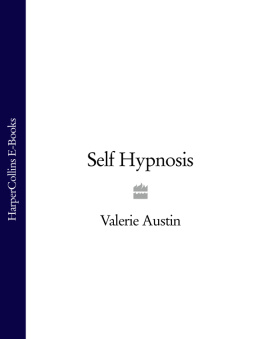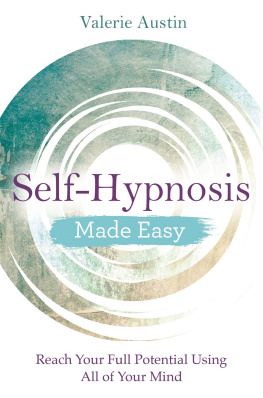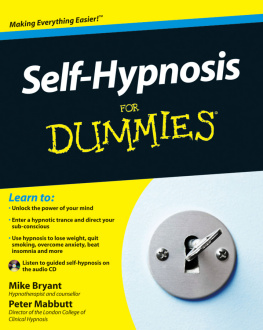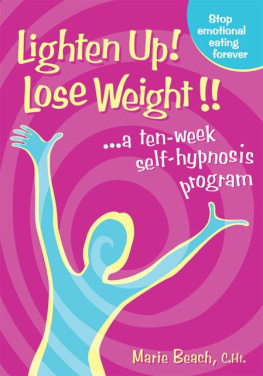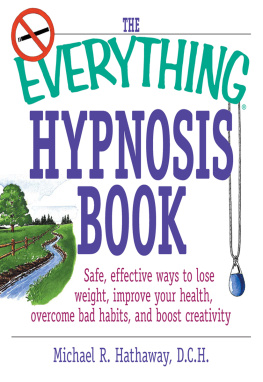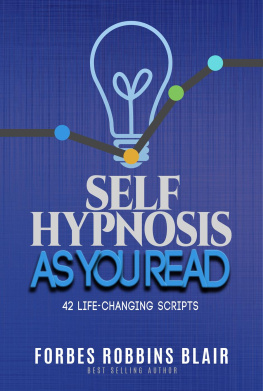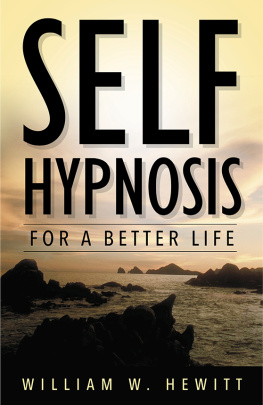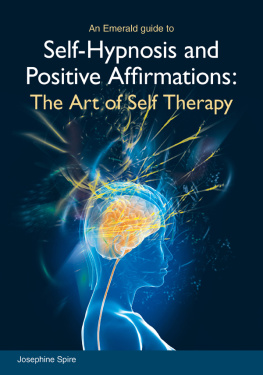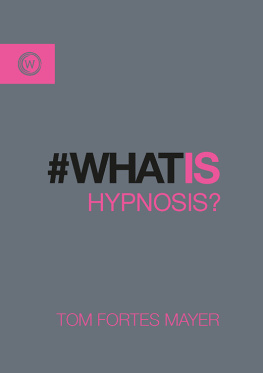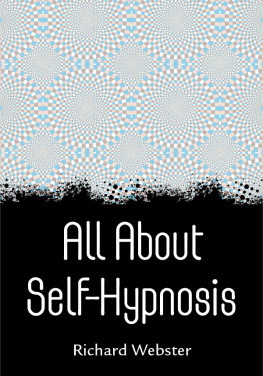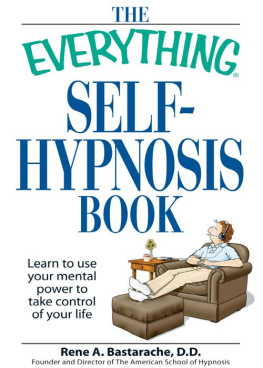
FOR MY SON

T o Peter, my love and thanks for years of patience. My agent and friend Roy Stockdill, whose encouragement, loyalty and occasional bullying helped me enormously.
Gil Boyne, who was responsible for introducing me to hypnosis in the first place.
Ormond McGill, an American gentleman in the true sense of the word, who brought dignity to his wonderful skill.
My colleagues and friends, Pat and Vic Leslie, for many years of comradeship.
Frank Lennon of the British National Register of Advanced Hypnotherapists.
Kay Kiernan for being a loyal friend in difficult times.
All my students, each one expanding my experience.
My thousands of patients.
Dr Michael aBrook, for sending me many of the above and for his wonderful sense of humour.
Dr Acharyya for his faith and support.
Mavis, Azman and Nina, Hj Ayub Abdul Ghani, Malaysia Airlines, the Malaysian Tourist Board, and the lovely people of Langkawi for their help and guidance.
Uri Geller for his positiveness and for mending my watch.
Paul McKenna, a brilliant stage hypnotist.
And finally my fondness and admiration to Mr Adam, wherever you may be now.

Y ou may find that the information in this book will help you, your relatives or your friends to relieve many problems, such as insomnia, smoking or weight control, to name but a few. But if you know someone who is in pain constantly and he or she would like some relief, the correct suggestions in the somnambulism state can give relief for hours. This is not a cure, just a natural relief, and should not be used to delay a visit to the doctor. But for someone with arthritic problems or pain-related illnesses or diseases, any relief will be a blessing.

W ords you will encounter throughout this book that sometimes cause confusion
Abreaction: A raw emotion triggered off in hypnosis which then surfaces to the conscious level.
Deepeners: Specially selected words that form instructions for the purpose of guiding the mind into a much deeper feeling of relaxation in trance.
Hypnosis: Not sleep but a heightened state of awareness, similar to a day-dream. A state that a subject can be guided into by relaxation techniques or which can be induced by confusion or shock.
Hypnotherapist: A person who uses therapy while his or her subject is in hypnosis.
Hypnotist: A person who guides another into hypnosis.
Induction: A type of script carefully formed to guide the mind into relaxation.
Suggestion: Words that encourage the subconscious part of the mind into some sort of participation, either physically or mentally.
Trance: Many hypnotherapists do not like this word, but I am using it to establish a state of hypnosis. When a person is in a day-dream he or she is also in trance.
one

I t all began with the car accident, the night I almost diedthe extraordinary twist of fate that led me to become a hypnotherapist. I would never have believed at the time that there would be a time in the future when I would count the awful calamities and traumas I was to experience as blessings, allowing me to put something back into life in the form of helping people. If I had not had the car crash I would not have had to seek treatment for a serious memory loss and would never have been forced into discovering hypnotherapy as a profession in the first place. The fact that I did, albeit through a bizarre combination of circumstances, is why I am able to share my knowledge with you now. Let me tell you about it
The car was speeding through the pitch black night, hurtling crazily out of control. I had no way of knowing which direction it was taking. I was very frightened and convinced I was going to die. Moments earlier I had been travelling at high speed on the motorway when suddenly I was forced to swerve violently to avoid a fleeing figure running directly in front of me. It was 1.30 a.m. and there was not even the palest glimmer of moonlight. Why on earth was someone crossing the motorway on foot? Did they intend to kill themselves? How ironic if that were so, as that was precisely what I had been contemplatinga quick end to my life.
As I wrenched the steering wheel to avoid the ghostlike figure, the car skidded and lurched forward into the unknown, deep in the Staffordshire countryside. My headlights no longer picked out the friendly cats eyes and I was spinning wildly towards thick undergrowth at the roadside.
I remembered being scared once before when I was a private pilot and wanted to qualify for a licence to fly at night. Unthinkingly I had chosen an extremely busy airport from which to do the two hours necessary flying. I was suddenly queueing in line with jumbo jets and getting swirled around in their back-draught. But that experience paled in comparison to my terror now. At least then there had been landing lights, but here, in this horror, there was not even a moon to cast shadows. A jumble of confused thoughts and questions swirled in my mind as I was buffeted from side to side of the car like a limp rag doll. Each jolt sent a dull pain through my body. It was all happening in a few, fleeting moments yet it seemed like an eternity, as if I were watching myself in some ghastly, slow-motion video playback. Not long before I had actually been thinking about killing myself over a broken love affair. Now, in those terrifying moments as the car spun wildly out of control in the darkness, I knew I did not want to die. All I could think of was what would be the result once the car finally came to a halt. Would I be crippled or scarred for life? Would anybody find me so late at night, or would I have to die slowly, badly injured and alone? Had I been selfish? Was this my punishment? Would the nightmare ever end?
Then, as suddenly as it began, it was over. The car shuddered to a halt. Later I learned that it had hit three trees and plunged 30 feet down a ravine. Amazingly, however, I had not hit my head against the windscreen. I can remember sitting there dazed and shaking, yet still being able to think with remarkable clarity. The cassette player was still blasting out disco music, shattering the stillness of the night. Somehow, the windscreen wipers had got switched on during the crash. In my numbed and dazed state I could not remember how to switch them off. I was also alert enough to realize that there might have been a petrol leak and that the car might explode at any moment.
As I slowly and painfully eased myself out of the door, I felt as if I was the star of my very own horror film. The whole thing was so eerie and unreal. I was still trying to work out why my head had not hit the windscreen. I had not been wearing a seatbeltthis was the 1970s and there were still conflicting views about themand the car had come to a dramatic stop. Later I learned that my head and face were the only parts of my body

